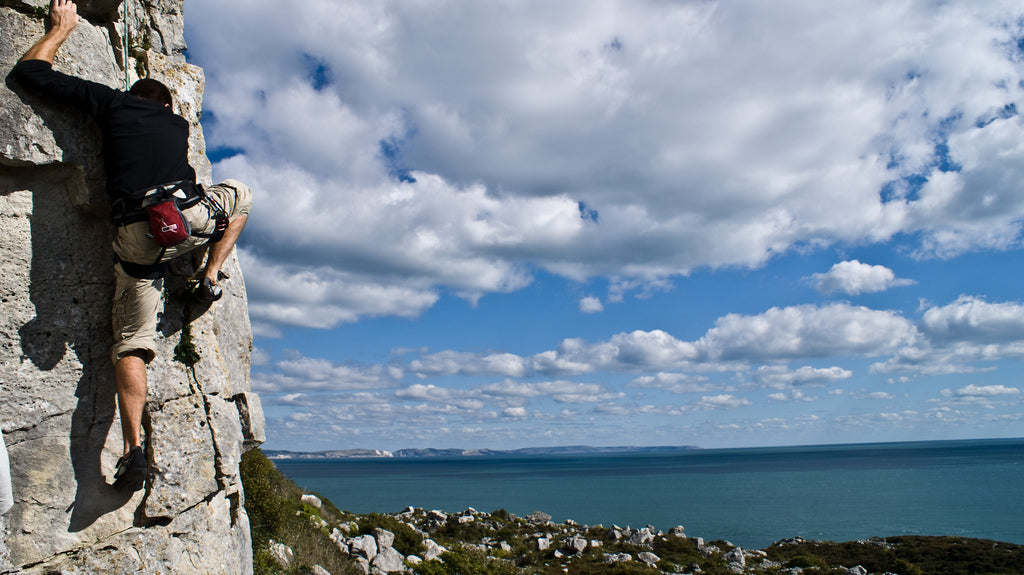Why surfers make better environmentalists than climbers

A couple of weeks back our founder Tim added a throwaway question to the end of a newsletter, asking why why surfers make better environmental campaigners than climbers? This wasn't a pop at one community from another. As he confessed, Tim climbs a bit himself. The query struck a chord with community member Soraya Abdel-Hadi, who got right back in touch with such a well worked through response, we had to share. Over to Soraya.
...
I was immediately engaged by Tim's question – sustainability is my specialist subject and I’m a climbing instructor – so why was this the case?
Why surfers are more likely than climbers to campaign.
Surfers see an instant and tangible impact on their environment. Obvious examples of this are plastic or sewage in the oceans. It immediately impacts their health and enjoyment – they are quite literally in it – and it is unpleasant, invasive and damaging.

Climbers, on the other hand, often understand that their environment is changing, but it's usually something that isn't quite so easy to pin down. It's slow changes – erosion, impacts of climate change etc. Most regular users of crags are considerate in terms of taking away rubbish, dealing with the immediate items in their environment, but as soon as they walk away the long-term elements are either forgotten or are impossible to fathom logical steps towards solutions.
The elements of success in campaigning.
The issues that surfers campaign on tend to be very easy to communicate to the wider population and easy to understand. You can show plastic in the water in a film. You can show dead baby birds with stomachs full of plastic. You can film sewage pipes spewing into the sea. Surfer-campaigners tend to stay away from some of the less accessible ocean challenges, such as ocean acidification. They probably feel strongly about them, but they are difficult to understand. And therefore difficult to explain.
Studies have shown that humans as a species turn away from things that are too 'distant' from them or are too complex (this is known as ‘wilful blindness’ – turning away from something that should be obvious to us). It's one aspect of why the approach to climate change has been so slow. Unfortunately for aspiring climber-campaigners, as mentioned above, most of the challenges the climbing environment faces are longer term. Therefore, they are harder to communicate. They are multi-source, complex problems with fewer obvious actionable steps.

Additionally, and crucially, generally people can understand what surfing is and why people might want to do it. The main activity of the surfer-campaigner can be shown on a film – an engaging and visceral medium. Most of the people targeted by these types of films/ campaigning are in the 'elite' of the world – they've seen the sea first hand, even if they don't live near it. They've probably been in it even if they haven't been surfing. They can understand how this might impact them directly, as well as being very clear on how it impacts users of the oceans.
In contrast, most of the world don't understand why people would climb. The enjoyment of climbing is very difficult to explain unless you have experienced it yourself. I teach climbing indoors and even there it's never the experience that people expect. There is more thinking involved and it requires more focus – people think it's going to be all about brute strength, which is a niche in itself. Being outside in the elements makes the whole experience different again!

The majority of people on this beautiful planet of ours haven't been to a crag, so they tend to associate outdoor climbing with Everest. Because of this, it becomes perceived as something a few people do that the majority of people are not really interested in and has no impact on their lives. It also doesn't translate particularly well to film unless you know what you are looking at.
It will be interesting to see if the inclusion of climbing in the next Olympics will change how climbing is viewed by a wider audience – will this give a better platform for climber-campaigners? (A side note, reports are suggesting that climbing is becoming more mainstream, but the majority of new climbers start, and then stay, indoors so do not gain that deeper connection to the environment.)
The passion behind the campaigns.
This is not a comment on the passion of the campaigners for their causes, but more a view of why some are more successful at highlighting their particular campaigns than others. I speak as a climber: we need to look at how we can better communicate about causes we are passionate about to a wider audience. We can definitely learn from passionate, successful surfer-campaigners who can mobilise campaigns outside their immediate peer group.

However, much of spreading the word about your particular campaign interest is about talking about it at every opportunity and bringing it to the attention of anyone who will listen, as well as showing that you are living your values to help your cause. No matter what your chosen sport is (or whether you have a sport at all), being brave enough to show up, speak up and take personal action are the first and most important steps to being a successful campaigner.
I think you’ll agree, we can all do a little bit more of that.
Awesome! Thanks Soraya, grest insights we're always open to thoughtful articles from our community.
In the interests of balance, see these vintage climbing guides demonstrating evidence of climate change.

Photo credits:
Surf imagery Tim Nunn Photography
Walk in to Stanage Mike Bean used under Creative Commons licence
Portland climber Steve Wilson used under Creative Commons licence
